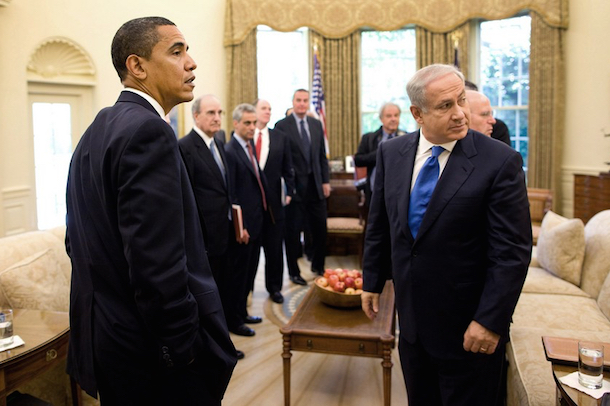
A Clean Break from Israel (What America Needs Now)
Although not in the manner of its original intent, Winston Churchill’s axiom “Truth is so precious that she should always be attended by a bodyguard of lies,” seems purpose built for framing a debate involving one of the most contentious issues of the day — this being the realities of the relationship between Israel and the United States. Indeed, whether related to the historical hard truths behind the affiliation or the existing bonds that underpin and define it, we come close to inverting the original intent of Churchill’s observation.
Moreover, in deliberating on the always contentious measure of influence Israel exerts on America and the concomitant state of play within and across the Greater Middle East deriving from that influence, we might also invoke Henry David Thoreau’s droll maxim, “Some circumstantial evidence does exist, such as when we find a trout in the milk.” As we’ll see, both aphorisms have singular relevance to our discussion going forward.
Some preliminary background though is necessary to prepare readers for the road ahead. The assassination in 1995 of then Israeli Prime Minister Yitzhak Rabin by a right-wing Jewish extremist hastened an early election in 1996 after which the uber-hawkish Likud Party assumed office. This elevated estimable hardliner — and Zionist poster-boy of the U.S. neoconservative movement – Benjamin (Bibi) Netanyahu, to the premiership.
Although not unexpected, for both Israel itself and its relationship with the U.S., Rabin’s assassination and the occasion of Bibi’s subsequent rise to power was a game changer, but possibly not in ways many might’ve imagined, regardless of whether they were Likud supporters or not. By reflecting on how much that “game” has changed, we can say there were indications of what was to come in the wake of Netanyahu’s ascension to power.
Shortly thereafter, an elite group of U.S. foreign-policy wonks concocted a manifesto for the new administration in Tel Aviv — expounded on herein briefly by Ray McGovern. It was called “A Clean Break: A New Strategy for Securing the Realm.” The membership of the “Clean Breaker” ‘club’ is notable. It included certain neoconservative luminaries who would later take up important positions within the George W Bush administration. After the events of 9/11, they went on to play forceful roles in the development and roll-out of its Greater Middle East policy, one whose disastrous legacy is still very much a work in progress.
According to Anti-War’s Dan Sanchez, the ‘Clean Breakers’ — including leader Richard Perle, David Wurmser, along with Douglas Feith and John Bolton and others — nominated Iraq first as a candidate for regime change. After Iraq, Libya and Yemen would then become ‘stepping-stones’ to overthrowing Bashar al-Assad in Syria, with Iran next on the list. As Sanchez says, the essence of the Clean Break manifesto went like this: “The weight of its strategic allies would tip the balance of power in favor of Israel, which could then use that leverage to topple the regimes of its strategic adversaries by using covertly managed ‘proxy forces’ and ‘the principle of preemption.’ Through such a ‘redrawing of the map of the Middle East,’ Israel would ‘shape the regional environment,’ and thus, ‘[Israel] will not only contain its foes; it will transcend them.'”
It was the Clean Breakers’ front man Perle (aka the ‘Prince of Darkness’) who throughout the ’90s led the charge for regime change in Iraq, principally under the auspices of the now-defunct Project for a New American Century. Whilst serving as chairman of the Defense Policy Board, a high-level Pentagon advisory committee, he was instrumental in the lead-up to war in Iraq in usurping foreign and national security policy in the George W Bush administration. Sanchez reports, “9/11 paved the way for realizing the Clean Break, using the United States as a gigantic proxy, thanks to the Israel Lobby’s massive influence in Congress and the neocons’ newly won dominance in the Bush Administration.”

Though Perle himself appears to have gone MIA of late, there’s been no shortage during the Obama era of like-minded individuals still ‘redrawing the map of the Middle East,’ a situation unlikely to change especially if Hillary Clinton is the next President. And as we now know, a battalion-sized “bodyguard of lies” accompanied the truth behind the real motives for the Iraq war. This latter reality is one recently brought home to us once more with the release of the Chilcot Report in the U.K., even if Chilcot avoided identifying the covert rationale for the war and the hidden motives of those who concocted it.
As for what Israel’s game plan for the Greater Middle East might be, it started well before Bibi and his Likud ‘Party-goers’ rose to power. We might first ask how did the Iraq invasion, the Carthage-like destruction of Libya, and the current war in Syria, fit into that game plan? In this Israel Shahak identifies the 1982 Oded Yinon Plan, called “A Strategy for Israel in the Nineteen Eighties,” as something of a precursor to the Clean Break strategy. In other words, it was an earlier marker for how the game plan was to play out, one uncannily resembling events that have unfolded since then.
Shahak observed that the OYP provided a blueprint for the Middle East for the then Zionist regime of Ariel Sharon, “based on the division of the whole area into small states, and the dissolution of all the existing Arab states.”
To underscore this, the following brief summary of Shahak’s interpretation of the OYP is instructive: 1) all the Arab states should be broken down, by Israel, into small units, [something which] occurs again and again in Israeli strategic thinking; [and that] 2) a strong connection with neoconservative thought in the U.S. is to be established and maintained, the aim being to make an Imperial Israel into a world power.
That said, it’s the degree to which Israel under the ‘Likudniks’ has propelled these changes and how much it continues to do so that we are mainly concerned with herein. Of particular interest aren’t just the developments that Netanyahu’s ‘Notables’ in Tel Aviv and in Washington (the latter faction of which I’ve come to calling the “Beltway Bedlamites”) have precipitated. It is the implications of these developments for the future that are of equal concern.
Grabbing the Third Rail
In revealing the ‘trout in the milk’ in all of this then, one of the most publicized and criticized efforts to attempt this was undertaken by Stephen Walt and John Mearsheimer. According to one commentator, the publication of their 2008 tome The Israel Lobby and U.S. Foreign Policy, “set off a political firestorm.” All this was despite the reality the book — itself a much expanded version of an earlier article published in 2006 in The London Review of Books because of the difficulty of getting it published stateside — offered impeccable documentation and measured arguments in support of the basic premise — which was: The inordinate influence Israel exerts over the U.S. domestic political scene and especially over its foreign and national security policy.
After observing that the US-Israeli relationship is so unique it has “no equal” in U.S. history, they asked a profoundly important question, one even more relevant today: Why has the U.S. been willing to set aside its own security and that of many of its allies in order to advance the interests of another state?
They rightly surmise any such bond between two countries might be justifiably grounded in ‘shared strategic interests or compelling moral imperatives.’ But as they argue, in this case neither of these rationales accounts for — nor we might add, legitimizes — the ‘remarkable level of material and diplomatic support’ that the US provides Israel. Nor does it account for the manner in which Israel has been able to corral U.S. public opinion in support of its cause, both points to which we shall return. To this they add: “[T]he thrust of US policy in the region derives almost entirely from domestic politics, and especially the activities of the Israel Lobby. Other special-interest groups have managed to skew foreign policy, but no lobby has managed to divert it as far from what the national interest would suggest, while simultaneously convincing Americans that [Israeli and] U.S. interests…are essentially identical.”

Now though further context and perspective is useful here, the nature of our subject matter necessitates it is cautiously advanced. Which is to say no matter how gingerly, well intended, or dispassionately it might be proffered, any critique of Israel is fraught with peril for those prepared to undertake the challenge. Indeed, we might say it’s tantamount to an exercise in ‘grabbing the third rail.’ This is irrespective of whether it’s related to Israel’s past conduct and present actions in the occupied territories and concomitant treatment of the Palestinians; the authority it wields over U.S. national security and foreign policy decision-making especially via academia, mainstream media, and various lobby groups and think-tanks; and/or the influence it exerts within and across the broad legislative and democratic process in America.
To be sure, the taboos associated with such critiques are many. The all-too-lethal accusation of “anti-Semitism” (a WMD of sorts, or ‘weapon of mandatory disparagement’), is frequently applied in knee-jerk fashion to those who simply call into question, leave alone criticize or condemn, the clout Israel wields, its motives, or its policies. We can never rule out of contention its easy application in such discussions.
Like so often happens when anyone simply questioning, much less openly challenging, the validity of official explanations of events (e.g. the 9/11 terror attacks), or the rationale for the actions and conduct of various groups or states (e.g. the real reasons why many Muslims hate America and want to attack it, or why the U.S. really did invade Iraq) — after which they are promptly labeled a “conspiracy theorist” — the reality is that far too many otherwise intelligent, informed, and rational people far too frequently conflate criticism of, and opposition to, any/all things Israel, with “anti-Semitism.”
Insofar as such responses go, when it comes to rational, informed debate about the Big Issues in an open, democratic society, therein lays a very big problem. To the extent that such a mindset prevails in this milieu, we might argue this it is at its most prevalent in the citadel of free speech that is America. This is especially true when we consider the state of America’s mainstream media reporting on any number and variety of those “Big Issues.”
Which is to say the “anti-Semite” appellation is often the first and last refuge of those who, whether Jews, Israeli citizens, or part of the diaspora, and even non-Jewish supporters of Israel, constantly seek for whatever reason to vindicate or justify that country’s actions and conduct, the aim to redirect, invert or distort the narrative, or prevent them speaking out about the real issues such “actions and conduct” raise. Again, not unlike the readily applied “conspiracy theory” epithet, this is a none-too-subtle, even insidious, form of censorship and thought control.

To be sure then, in the ‘battle’ to establish one’s own unique brand of discrimination, prejudice or racist smear as the premium exemplar thereof — and, by extension, cement its place as the one that unfailingly attracts the most opprobrium when its adherents perceive anyone ‘guilty’ of any behavior or utterance however/whenever it might loosely defined and/or then expediently applied — the appellation “anti-Semitic” has long since commanded ‘market leadership’ status. In the ‘marketplace’ of moral disapprobation, no other condemnation comes even close.
Either way, in his book Beyond Chutzpah: On the Misuse of Anti-Semitism and the Abuse of History, as the title suggests, Norman Finkelstein goes to some length to articulate such views: That anti-Semitism itself, and broader global opposition or even antipathy toward Israel — such as might be exemplified by the Boycott, Divestment, Sanctions or End the Occupation movements — will prevail as long as Israel resists addressing current policies.
Of course it is in Palestine where these policies manifest themselves most obviously and most criminally. Finkelstein – a man as notable for the fact he is a prominent Jewish intellectual who attempts to bring a measure of objective insight and coherence to the discussion of the issues at the heart of our narrative as he is for the reality he has been pilloried by many for his efforts in doing so — notes that whenever Israel comes under international pressure to genuinely address then satisfactorily resolve the Palestinian question or faces some other public-relations debacle, “…its apologists mount a campaign alleging that the world is awash in a ‘new anti-Semitism,’ the purpose of these periodic extravaganzas is not hard to find: on the one hand, the perpetrators are turned into the victims, putting the spotlight on the alleged suffering of Jews today and diverting it from the real suffering of Palestinians; on the other hand, they discredit all criticism of Israeli policy as motivated by an irrational loathing of Jews…”
It should hardly be surprising then that for their efforts Walt and Mearsheimer were subjected to a barrage of ad hominem criticism, even abuse, from the Israel Lobby and the broad spectrum of Israeli “apologists,” one that indeed is exceedingly “broad.” This included being called “liars,” “extremists,” “bigots” and of course, the de rigueur one-size-fits-all “anti-Semitic” sobriquet.
It is a measure of the collective vehemence — to say little of the choleric incoherence of some individual critics — that they took the extraordinary step of countering the criticisms in a follow-up essay. Though this response was remarkable as much for the breadth of its coverage as it was for its length, by and large they stuck to their guns concerning the main premise of their book.
Yet for all the righteous umbrage these authors attracted, if anything they were ‘pulling their punches.’ Their book though might’ve been something of a watershed moment; increasingly more and more folks seem to be now speaking out about the vexatious issues that arise from Israeli foreign and national-security policies with a view to bringing about change, and it’s not before time. In these matters such spurious tactics employed to that end (subverting the debate and/or silencing dissenters by imposing upon them the garden-variety groupthink), have passed their ‘use-by date.’ This includes many Jewish individuals and groups – a development as gratifying as it is encouraging — to which the number of such on Facebook and Twitter alone are ample testament.
The reality is that the “clout and influence” Walt and Mearsheimer identified have always been prevalent, even before Israel’s inception in 1948. Few observers would argue the following: Israel’s creation would not have been possible without American support, a reality laid bare in Alison Weir’s book Against our Better Judgment.
It is instructive to note that this occurred at a time when there was considerable opposition within the United States to the creation of a Jewish state in Palestine (ironically, though not coincidentally, when America was held in especially high regard in the Arab/Muslim world), with many senior and influential figures in the then administration and the broad foreign-policy establishment — along with prominent Jewish figures such as Albert Einstein — envisaging the very problems that have plagued the region ever since.
But again this extraordinary power and influence has been especially prevalent and evident since the 1967 Six-Day War against Egypt, with further consolidation occurring after the Yom Kippur War of 1973. That these two events together did much to shape and strengthen the bilateral relationship between the U.S. and Israel is a given. They proved to be pivotal turning points in the way the Washington establishment responded to Israel’s supporters in the U.S., in the main represented by the much-vaunted Israel Lobby. Significantly, they also served to bolster Israel’s geopolitical hegemony and regional military supremacy.
That this state of affairs has compounded since the bloody carnage that characterized the 1982 War in Lebanon (the aftermath of which brought about a complete rethink in how Israel ‘told and sold’ its narrative and from there managed perceptions of its conduct and behavior, particularly in the U.S.), the First Gulf War and especially since the events of 9/11 and the War on Terror, is axiomatic.
With Friends Like These
Though it would not normally be deemed necessary — at least not for rational, reasonable people concerned with the application of international law and respect for human rights or any other matters at the heart of the conflict — such is the nature of our subject matter herein, one feels compelled to stress the following: Any ‘gripe’ I might have is not now, nor has it ever been, with Jewish people per se. Irrespective of whether they are Israeli or American citizens or those within/across the broader diaspora, whether secular or otherwise, such ‘gripes’ are most definitely not with those who authentically identify with, or might have a legitimate claim on, their rightful heritage, whether it be cultural, religious, racial, regional and/or ethnic in origin.
But the political ‘heritage’ — and accompanying historical baggage — is an altogether different beast. This is especially true as it pertains to Greater Israel and the contemporary reality of its past and present policies. And it’s not just the “reality” of those policies and how they are playing out that is of major concern here (along with the degree the U.S. itself is complicit in facilitating how they do play out), it is the morality and legality. One might also want to ponder the necessity of it all, to wit: What is Israel’s ultimate endgame in Palestine and in the Greater Middle East?
For many the answer to this question is patently, indeed, frighteningly, obvious! The Clean Breakers’ were not shy about setting out their stall therein.
Yet by the same token, it is also vitally important we consider the Palestinians and their own cultural, religious and/or ethnic heritage — to say little of their basic human, moral, property and legal rights — that’s been denied, rescinded or destroyed by successive Israeli administrations (a process that began before Israel’s inception) with the tacit support of successive US administrations.
Who’s standing up for them, we might ask, this being the 64K-shekel question!
It’s not Jewish people in general or Israelis in particular who require folks standing up for them; they seem to be quite capable of looking after themselves.
All of which is to say, however such views might be interpreted by anyone outside an otherwise objective frame of reference, one’s views on Israel such as they are and its connection to, and relationship with, Zionism (that is of course the aforementioned “political” dimension), are necessarily based on what are the policy realities and outcomes. These are especially those to do with the inordinate, manipulative, and pernicious influence that AIPAC and its numerous affiliates, sympathizers and supporters in both the US and beyond, along with the hard-right neoconservatives — many of whose leading lights are either dual US/Israeli citizens, evangelical Christians (of the extreme ‘end-times’ kind, some of whom identify with Zionism or as Zionists), and/or sundry apologists for Israel — have on US foreign and national security policy in particular.
Either way, there can be little doubt that both the George Bush and Barack Obama administrations were/are heavily influenced by any number of powerful special-interest groups, not least the Zionist dominated, neoconservative groups, as already noted, in cahoots with the media ‘opinionocracy,’ sundry think-tanks, along with countless perception managers and merchants of doubt who append themselves to any cause in the untrammeled, unprincipled pursuit of the filthy lucre irrespective of the morality or legality of the issue. Though ‘Jewishness’ itself — however it might be defined — is not a necessary condition for being neo-conservative and/or Zionist, a not-insignificant number of prominent neocons identify themselves as Jews if not avowed Zionists (many by all accounts with dual citizenships and, by definition, potentially conflicted loyalties), and are inarguably the most forceful and influential of any discrete group.
Then there is the exorbitant (some might say extortionate) amount of aid and support in all of its variant forms that America provides Israel, the no-strings-attached largesse of which no other nation in the world comes within a country kilometer. This is a reality indisputable for all but the most politically myopic or reality impaired, with the recently renegotiated Israel aid agreement by all accounts is more favorable than ever.
Indeed, this time round, Netanyahu — a man not averse to wearing his chutzpah on his sleeve, and who was once caught on camera declaring, “I know what America is…[America] is a thing you can move very easily” — was not shy about demanding even more aid from Washington. Doubtless, these demands will be met with gracious equanimity when the new administration is sworn in next January.
A Highly Successful Act of Hypnosis
For those folks predisposed to questioning or critiquing the narrative herein, they may wish to watch the recently released documentary The Occupation of the American Mind: Israel’s Public Relations War in the United States. Narrated by Pink Floyd’s Roger Waters, this powerful and timely film provides a much needed ‘tonic of truth’ to the Palestinian-Israeli conflict. After viewing this film, anyone with any illusions or uncertainties about who the ‘good guys’ and ‘bad guys’ are in this interminable standoff will — unless afflicted with an incurable case of cognitive dissonance — be disabused of all of the above in one fell swoop.
As the film’s title suggests, the narrative therein delivers an essential insight into the the self-serving duplicity, mendacity and unalloyed hypocrisy of the Israel Lobby, along with providing another exemplar of how America’s elected representatives so poorly serve their primary constituency, and we might say their country’s own national interest!
Just as significantly, it serves as a no-punches-pulled indictment on the venality, irresponsibility and double standards of the corporate media establishment in the U.S., especially in the way it unfailingly caters to special-interest groups at the expense of truth, balance, and integrity in their reporting of the Big Issues. To be sure, of all the “Big Issues,” they don’t come much bigger than the Palestine-Israeli conflict, and of all the so-called “special-interest groups,” few come much more “special” than the Israel Lobby.
In relation to the Palestinian question alone, for this writer Israel has over the years forfeited vast chunks of the seemingly inexhaustible moral capital it accumulated as a result of revelations about the Holocaust, and AIPAC and its institutional ilk for their part have been instrumental in facilitating this.
Likewise, for its part Israel — and the drivers of its own overarching narrative and its trajectory since its inception in 1948 as a newly formed national entity in the aftermath of the Holocaust and the broader devastation of the war — had a ‘heavy-duty’ moral obligation to present to the world at large an historically unprecedented example of how a civilized nation populated by a peaceful, just, lawfully minded, empathetic people, itself built on the very notion of an inarguable recognition and acceptance of inviolable, universal human-rights principles — might conduct itself in the modern age.
Moreover, if as some people seem to think that anti-Semitism is on the rise, to the extent this might be true then there can be little doubt much of it, if not most, is fueled by the policies of the very country that purports to act in the interests of all Jews. For his part Steven Spielberg is one such notable who recently mused on his own ‘naiveté’ in thinking that anti-Semitism was a thing of the past. Yet we might have all thought apartheid was also similarly consigned.
But as the record clearly shows, it is in Palestine under Israeli occupation that that other “A-word” – like anti-Semitism, a brand of discrimination at least as equally repulsive as it is loaded — is alive and kicking as it were. It’s uncertain if the acclaimed director of Schindler’s List reflected much on this reality before publicly airing his misgivings.
If anti-Semitism is any more pernicious, or for that matter more prevalent, than any other form of racial, ethnic or religious bigotry, intolerance, prejudice and/or animus, then right-thinking, fair minded Jews — in particular those with a strong sense of individual morality and common decency towards those not just of their own ethnic, racial, cultural or religious persuasion, but to the people who’ve been mercilessly and relentlessly hounded out of their homes and homelands and upon whom extraordinarily vile and inhumane injustices have been perpetrated and atrocities visited in their name — have an inarguable obligation to stand up and be counted.
More than that, as the presumptive representative of the interests and ostensible defender of the rights of Jewish people generally, Israel had an historical opportunity to present itself as such and truly act accordingly. The benefits of doing so would have been incalculable to its prestige and stature as a nation and as a people, [to] the Middle East region, [to] America itself, and the rest of the world. From there then we might well opine that anti-Semitism to all intents may have finally been consigned to history’s trash bin.
And whilst it may not stop the spread of terrorism in its tracks, few would argue that doing so would take the wind out of the sails of many a jihadist — potential or active — bent on suicidal retribution against Israel, its principal benefactor America, and the West in general. Yet it seems tragically on all the above counts, that ‘train’ may have already left the station.
If Israel cannot make a “clean break” from its past and present policies, then America — along with those nations broadly supportive of said policies and approving of their conduct — needs to make a “clean break” from them. This will be the only way the country is ever likely to come to its senses, and from there begin the long hard process of recognition, renunciation, reconciliation and restitution.
By necessity and by definition, this should involve the following: 1) a recognition their actions, behavior and conduct defies all legal, moral and ethical standards and norms and that it is not longer acceptable to the international community; 2) a renunciation of the hegemonic goals and ambitions identified in the Clean Break strategy, the Oded Yinon Plan, and similar manifestos such as The Likud Charter; 3) a reconciliation with not just the Palestinians but their neighbors in and across the Greater Middle East; and, 4) a restitution of sorts that fully compensates those who have lost the most from this conflict and redresses the sins and transgressions of the past.
I can think of no more fitting coda to the narrative herein than to quote from an acceptance speech the English playwright Harold Pinter delivered when he received his Nobel Prize in literature in 2005, one that as it turns out takes our narrative ‘full circle.’ In reference to the lies we were told about the Iraq invasion, and from there intoning that “the truth is something entirely different, [which] is to do with how America understands its role in the world and how it chooses to embody it,” he continued with the following:
Everyone knows what happened in the Soviet Union and throughout Eastern Europe during the post-war period: the systematic brutality, the widespread atrocities, and ruthless suppression…All this has been fully documented and verified. But my contention here is that U.S. crimes in the same period have only been superficially recorded, let alone documented, let alone acknowledged, let alone recognized as crimes at all. It never happened. Nothing ever happened. Even while it was happening it wasn’t happening. It didn’t matter. It was of no interest. The crimes of the U.S. have been systematic, constant, vicious, remorseless, but very few people have actually talked about them. You have to hand it to America. It has exercised a clinical manipulation of power worldwide while masquerading as a force for universal good. It’s a brilliant, even witty, highly successful act of hypnosis.
With Pinter’s withering indictment ringing in our ears, one might substitute Israel here in place of — or indeed for that matter, down there alongside — America.

